- Home
- Michael Bond
Monsieur Pamplemousse Hits the Headlines
Monsieur Pamplemousse Hits the Headlines Read online
Monsieur Pamplemousse Hits the Headlines
MICHAEL BOND
Contents
Title Page
Chapter One
Chapter Two
Chapter Three
Chapter Four
Chapter Five
Chapter Six
Chapter Seven
Chapter Eight
Chapter Nine
Chapter Ten
Available from ALLISON & BUSBY
About the Author
Copyright
Chapter One
History wasn’t Monsieur Pamplemousse’s strong suit, but when Pommes Frites sank his teeth into Claudette Chavignol’s derrière which, as ill luck would have it happened to be sans culottes at the time, he couldn’t help being reminded of the occasion in 1796 when Napoleon Bonaparte suffered a similar fate. It was the future Emperor of France’s wedding night, and as he climbed into the marital bed, Josephine’s pet dog Fortuné, thinking his mistress was about to suffer a fate worse than death, leapt to her defence.
It was probably the first, but not necessarily the last time Napoleon uttered the immortal phrase, “Not tonight, Josephine!”
There the comparison ended. The two derrières bore little resemblance to each other. Had he been asked to voice an opinion on the subject, Monsieur Pamplemousse would have said that fortune had smiled on Pommes Frites, whereas Fortuné had drawn the short straw.
He had no means of knowing if his faithful hound’s spirited attack on Madame Chavignol had any after effects, although he doubted if many men had suffered as a consequence, but in Napoleon’s case the experience certainly put him off dogs for the rest of his life.
In some respects the Emperor ought to have considered himself lucky. Pommes Frites weighed in at some 50 or so kilos. Had he landed on top of him, Josephine might have been impressed, but the whole course of history could have been changed.
These things were largely a matter of chance. Or were they? Sometimes, past, present and future seemed to be inextricably intertwined.
In retrospect, Monsieur Pamplemousse often wondered if the circumstances leading up to his involvement in the gruesome affair of Monsieur Claude Chavignol’s death in front of several million viewers had been preordained.
However, such thoughts were far from his mind that Sunday morning when he was heading for the Porte de Bercy and decided to take a short cut rather than stick to the main road. It was something he had done many times before over the years.
Indeed, on sunny weekends in late autumn, when all Paris seemed to be heading towards the Bois de Vincennes for one last day out, it was often his preferred route.
That said, it was a classic example of how, simply by obeying an impulse and turning a corner, one’s whole life can be turned upside down. In retrospect, he sometimes tried to picture what might have happened had he carried straight on along the Rue Claude Decaen. Would the murderer have got away with it? He would never know for sure.
It was the first time he had ever met with any trouble turning off where he did. As it was, no sooner had he accelerated away from the junction in order to gain as much ground as possible, than he encountered a row of red warning arrows in the middle of the road. At the same time a gendarme emerged from behind a portable cabin and signalled him to pull in to the side.
It all happened so quickly several seconds passed before he applied the brakes.
Pommes Frites was taken by surprise too. Until that moment he had been happily enjoying the passing scene from the passenger seat. He looked most put out as he ended up with his chin on the dashboard.
Aware that he had come to rest several metres beyond the spot indicated by the gendarme, Monsieur Pamplemousse fully expected his emergency stop to be the subject of a verbal comment or two. Perhaps even a check to see when he’d last had his brake pads renewed.
Instead, the officer saluted politely as Monsieur Pamplemousse opened the window. There was no sign of recognition. He was probably too young to remember the face that had once graced the pages of a thousand journaux. Snapping to attention and saluting was fast becoming the exception rather than the rule.
‘Monsieur…’ clearly a man of few words, the gendarme directed his baton towards another figure emerging from the hut. Dressed in civilian clothes, he was hastily brushing some croissant crumbs from his trousers with one hand, while clasping a clip-board in the other. ‘A few questions.’
‘It will only take a moment or two.’ The newcomer produced a ballpoint pen from his top pocket and clicked it open in business-like fashion. ‘Now, you are travelling to where?’
‘Melun,’ said Monsieur Pamplemousse. ‘Near Fontainbleau.’
‘Business or pleasure?’
‘Neither.’
The man raised an eyebrow. ‘I have only two boxes, Monsieur. It is necessary to place a tick in one or the other.’
‘I am visiting my sister-in-law.’
‘Aaah!’ The point was taken. His pen hovered momentarily over the clipboard. Even the most carefully thought-out forms had their grey areas.
‘Monsieur is making a regular journey?’ he asked hopefully.
‘I make it as seldom as possible,’ said Monsieur Pamplemousse. ‘Tell your superiors that if they are thinking of building an underpass based on your survey, it would be a poor investment of the tax-payers money to do so on my behalf.’
‘There have been complaints from the local residents about the amount of through traffic.’
Monsieur Pamplemousse climbed out of his car and looked around. It struck him as being a particularly neglected part of the 12th arrondissement, but he resisted the temptation to say ‘What residents?’ The sooner the questions were answered, the sooner he would be on his way.
‘I hardly think my contribution is of any moment,’ he said. ‘I travel this way perhaps two or three times a year at the most. I visit Melun to fetch my wife after she has been staying with her sister.’
‘That is not how a statistician would view the matter, Monsieur,’ said the man stiffly. ‘Everything has to be taken into account. Only when all the relevant information has been collected and fed into the computer will the final result be known. But they are not infallible. A few years ago one threw up the suggestion that the only way to resolve the traffic problem on the Champs Èlysées would be to turn the Place de la Concorde into a pedestrian precinct. Imagine the uproar that would have caused.
‘Alors! You would be surprised. Only yesterday we had a man who uses this road four times a day, five days a week, and has done so for the past fourteen years. It is his preferred route. Now, he would dearly love an underpass between here and the other side of the périphérique. It would probably halve his journey time.
‘On the other hand, a few minutes ago a man passed through who was on his way to Iceland. It will be the trip of a lifetime. He won the holiday after entering a competition on the back of a packet of breakfast cereal. It is probably the only time he will ever pass this way. Looking on the dark side, should his luck change and he happens to meet with an accident while he is over there – slipping on some black ice, perhaps, or turning the thermostat up too high when he retires for the night in his igloo – we may never see him again.
‘Then again, early this morning there was a lady who was on her way home from the 18th arrondissement. She works nights in the Pigalle area. She said she was dying to get back to her own bed in Ivry-sur-Seine and if I didn’t keep her talking too long I was welcome to enjoy a quickie behind my hut…’ He felt in his pocket. ‘She left me these to distribute. I tell you, Monsieur, in this job you meet all sorts.’
Monsieur Pamplemousse ha
stily refused the proffered card. ‘Merci beaucoup! In any case, I am from the 18th myself.’
He felt a jolt as the gendarme kicked one of the back tyres. It was the time-honoured test. Fortunately he could detect no sound of escaping air. To have to change a wheel at this stage of the journey would be the last straw.
‘And did you find a suitable box to tick?’ he asked.
Ignoring the remark, the man glanced across at Pommes Frites and made an entry. ‘Passengers…un.’
There was another jolt as the gendarme applied his foot to the nearside front tyre. He looked disappointed when nothing happened. ‘You don’t come across many 2CV’s these days,’ he said. ‘In fact, I haven’t seen one in years.’
Monsieur Pamplemousse couldn’t help thinking there wouldn’t be any left at all if the gendarme had his way. He was glad he had invested in Michelin radials. They could withstand anything that was thrown at them.
‘Does the dog always travel with you?’ asked the interviewer.
‘Invariably,’ said Monsieur Pamplemousse firmly. ‘He performs a valuable service, especially on days like today. For déjeuner we will be having tripes à la mode de Caen and I shall need his help. My sister-in-law Agathe first served it to me many years ago when I was courting my wife. In order to gain favour I said it was the best I had ever eaten. She has been serving it to me ever since.’
The man looked up at him sympathetically. ‘It is not good?’
‘It is arguably the worst I have ever encountered,’ said Monsieur Pamplemousse fervently. ‘Agathe is a lovely person. She has a heart of gold. But she has two faults. She “enjoys” bad health and, unlike my wife, she is a terrible cook.’
‘The two often go together,’ said the gendarme, joining in the conversation. ‘To be successful, tripes à la mode de Caen need a great deal of lengthy preparation. Ideally, the tripe should come from ruminants that have been fed in guimaux meadows, that is to say meadows bearing two crops of grass a year. The belly, the first and second stomach, along with a calf’s foot, which of course should be split, the bone removed, then blanched, all need to be thoroughly washed in cold water. This is especially the case with the second stomach, which is honeycombed and can be a source of trouble. Then a flameproof casserole dish – preferably the flat type peculiar to Normandy – should be lined with sliced apple and onion. Reinette apples are supposed to be the best. The most important ingredients after that are carrots, onions, leeks, a bouquet garni, and of course cider, preferably dry from the Vallée d’Auge, with a few tablespoons of Calvados mixed in.’
Monsieur Pamplemousse revised his earlier assessment of the gendarme. He was clearly a man to be reckoned with.
‘There are those,’ broke in the man from the census office, ‘who say it is not necessary to put apple in the casserole. They say the best solution is to round off the meal with an apple tart afterwards.’
‘I have an aunt who lives in Caen,’ said the gendarme stiffly. ‘I think she knows what she is talking about. She maintains the real secret is in the slow cooking.’
‘It should be given at least twelve hours,’ agreed the interviewer. ‘Not a minute less. I, too, have relatives in Normandy,’ he added, not to be outdone.
‘I doubt if my sister-in-law gives hers more than two hours,’ said Monsieur Pamplemousse. ‘She turns the heat up high.’
‘Sacré bleu!’
The gendarme crossed himself. ‘If you ask me, short cuts are a symptom of a nation in decline,’ he said gloomily. ‘Everyone is in a hurry these days.’
As if to underline his words there came the sound of a horn. Glancing over his shoulder he glared at a Peugeot, the first in a growing line of vehicles, and signalled the driver to wait.
Monsieur Pamplemousse was tempted to point out that if the officer had been out directing traffic on the main road people wouldn’t need to take a short cut, but he restrained himself.
‘That is why we are conducting this survey,’ said the interviewer, coming to his rescue. ‘If a new bypass is built this road will no longer be a short cut.’
‘I haven’t looked in a supermarché,’ he continued, ‘but it wouldn’t surprise me to find that many of them stock deep-frozen tripes à la mode de Caen these days.’
The gendarme shook his head sadly. ‘Nothing is sacred. Full of additives no doubt. Along with instructions to give it three minutes in a microwave!
It is criminal. There are some things in life that can’t be hurried.’
‘My wife’s sister Agathe’s tripes à la mode de Caen is not only a criminal offence,’ said Monsieur Pamplemousse, ‘it is also very grey.’
‘Ah,’ said the gendarme. ‘Now that is possibly because she has not sealed the lid of the tripière properly. It needs to be done very thoroughly with pastry dough in order to preserve the whiteness of the intestines.’
‘With respect, Monsieur, that need not necessarily be the cause.’ The driver of the Peugeot joined in the conversation. ‘Forgive me, but I couldn’t help overhearing. The use of too much cider in the liquid is often a cause of blackening.
‘The making of tripes à la mode de Caen is a construction job. The tripe itself needs to be cut into 5cm squares. The arrangement of the various layers is important. It is a case of building up from a generous bottom layer of onion to form the base, and then come the diced carrots followed by the leeks. After the meat has been arranged it should be covered with a layer of beef kidney lard before the cider is added.’
‘I doubt if my sister-in-law adds any cider,’ said Monsieur Pamplemousse gloomily. ‘She may show it the label on an old bottle, but that’s as far as she would ever go. Again, unlike my wife, she is teetotal.’
It was a conversation stopper.
‘No Calvados?’ asked the newcomer.
‘Pas de cidre?’ exclaimed the interviewer.
‘Not even any jus de parapluie?’ The gendarme used the slang term for cheap wine.
Monsieur Pamplemousse shook his head at all three possibilities.
‘It is no wonder you don’t go to see her very often,’ said the interviewer. He clicked his pen shut. ‘She would be better off buying it ready cooked from a delicatessen.’
There was a moment’s silence as the others turned to look at each other in despair.
Catching Pommes Frites’ eye, Monsieur Pamplemousse wondered if he should seize the moment to make a dash for it. He didn’t feel it incumbent upon himself to apologise for his sister-in-law’s shortcomings. He glanced pointedly at his watch. He could hear the steady hum of traffic in the distance and he was anxious to be on his way. At the rate they were going he must have lost several hundred places. It was worse than being sent back to DÉPART in a game of Monopoly.
But he had left it too late. The gesture was like water off a duck’s back. The others were off again.
‘These things,’ said the Peugeot man, ‘traditional recipes… must not be allowed to die out. Regional cuisine is what makes our country the way it is.’
‘Such specialities are one of the joys of travelling in France,’ agreed the gendarme. ‘It is one of our great strengths. Part of our national heritage.’
‘It is also the backbone of the tourist trade,’ broke in the man from the census.
‘I’m not so sure.’ The Peugeot driver looked sceptical. ‘The concept of regional specialities is foreign to Americans. Apart from that, they don’t understand the joy of driving. To them a car is merely a means of getting from point A to point B as quickly as possible.’
‘Not just Americans,’ said another man who had just arrived on the scene.
‘Take peas. There are many in France today who have never known the joy of running their thumb down a half open pod and watching the contents fall out.’
‘There is a particular sound as they land in the vessel,’ agreed a fifth. ‘It is like that of rain falling on a tin roof.’
‘I prefer broad beans,’ said the Peugeot man. ‘I love the furry feel on the inside of the pod – the
little pockets for each bean.’
‘My vote would go to the moment when you unearth the first of the new season’s potatoes,’ said the interviewer. ‘There is nothing like it. It is how I always imagine prospectors must feel when they are panning for gold.’
‘Most of all,’ said Monsieur Pamplemousse, ‘there is the joy of eating them. With freshly picked peas and beans there is the slight crunchiness of the outside, followed by the explosion of tastes from within.’
‘There are those,’ said the gendarme, ‘who will never experience such things. I dare say they think they grow on trees. It is as I said in the beginning, everyone is in too much of a hurry.’
Monsieur Pamplemousse felt it was time to take a hand. ‘If a job is worth doing,’ he said, ‘it is worth doing well.
‘I live near the vineyard of Clos Montmartre. It has over 2000 vines; mostly Gamy and Pinot Noir. It is overseen by a Monsieur Gourdin. Every year at the time of the harvest he supervises the taking of the grapes to the mairie for fermentation in the basement.’
‘That is true,’ said the gendarme. ‘I am told that at such times they can smell it in the Prefecture de Police next door. It is a good smell and it reminds them to get ready for the big street party on the first Saturday in October – the Fête des Vendages.’
‘Unfortunately,’ continued Monsieur Pamplemousse, ‘because the vines are planted on a North facing slope, even in a good summer it is hard to produce top quality wine. It used to be said that the 700 or so bottles they manage to produce acted as a diuretic, every quart becoming four more, making those who drank it leap around like goats. But it is all in a good cause. The money from the sale goes to charity. For many years it was the only vineyard left in Paris to keep the flag flying. Since his arrival, Monsieur Goudin has inspired others. Small vineyards are starting to spring up all over the place.’
‘That is also true,’ agreed the gendarme. ‘Once upon a time the Paris region had over 20,000 hectares of vineyards, but they were all decimated by the outbreak of phylloxera in the late nineteenth century. Now, they are even growing grapes at a fire station in the 9th.’

 Paddington on Top
Paddington on Top Paddington Takes the Test
Paddington Takes the Test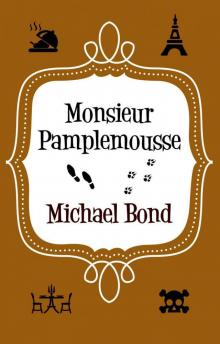 Monsieur Pamplemousse (Monsieur Pamplemousse Series)
Monsieur Pamplemousse (Monsieur Pamplemousse Series) Paddington Here and Now
Paddington Here and Now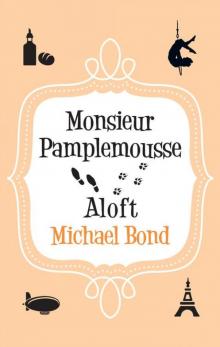 Monsieur Pamplemousse Aloft
Monsieur Pamplemousse Aloft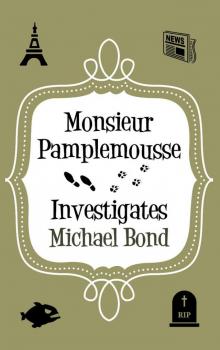 Monsieur Pamplemousse Investigates
Monsieur Pamplemousse Investigates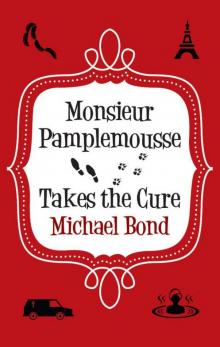 Monsieur Pamplemousse Takes the Cure
Monsieur Pamplemousse Takes the Cure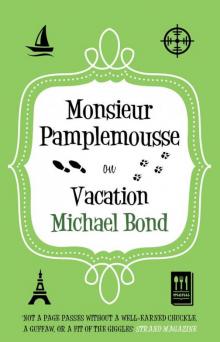 Monsieur Pamplemousse on Vacation
Monsieur Pamplemousse on Vacation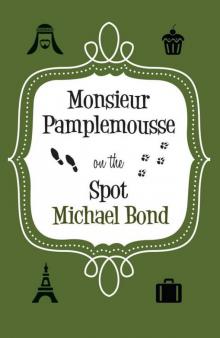 Monsieur Pamplemousse on the Spot
Monsieur Pamplemousse on the Spot Monsieur Pamplemousse Hits the Headlines
Monsieur Pamplemousse Hits the Headlines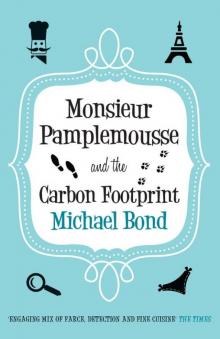 Monsieur Pamplemousse and the Carbon Footprint
Monsieur Pamplemousse and the Carbon Footprint Love from Paddington
Love from Paddington Paddington’s Finest Hour
Paddington’s Finest Hour Paddington Complete Novels
Paddington Complete Novels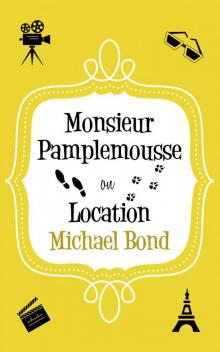 Monsieur Pamplemousse On Location
Monsieur Pamplemousse On Location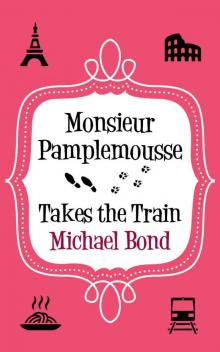 Monsieur Pamplemousse Takes the Train
Monsieur Pamplemousse Takes the Train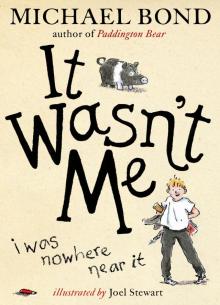 It Wasn’t Me!
It Wasn’t Me! Paddington Races Ahead
Paddington Races Ahead Monsieur Pamplemousse and the Tangled Web
Monsieur Pamplemousse and the Tangled Web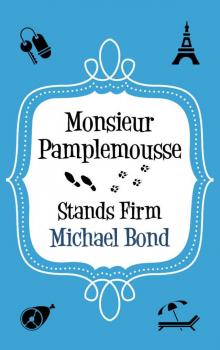 Monsieur Pamplemousse Stands Firm
Monsieur Pamplemousse Stands Firm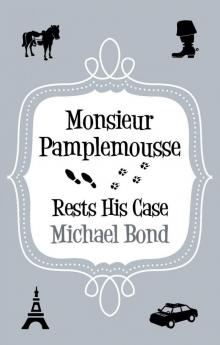 Monsieur Pamplemousse Rests His Case
Monsieur Pamplemousse Rests His Case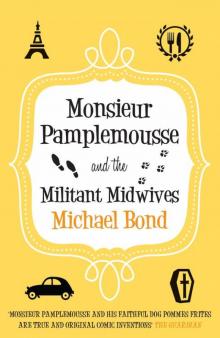 Monsieur Pamplemousse and the Militant Midwives
Monsieur Pamplemousse and the Militant Midwives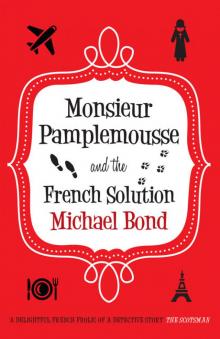 Monsieur Pamplemousse and the French Solution
Monsieur Pamplemousse and the French Solution Paddington Helps Out
Paddington Helps Out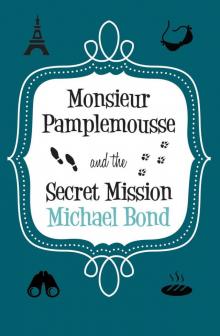 Monsieur Pamplemousse & the Secret Mission (Monsieur Pamplemousse Series)
Monsieur Pamplemousse & the Secret Mission (Monsieur Pamplemousse Series)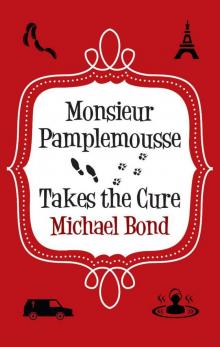 Monsieur Pamplemousse Takes the Cure (Monsieur Pamplemousse Series)
Monsieur Pamplemousse Takes the Cure (Monsieur Pamplemousse Series) A Bear Called Paddington
A Bear Called Paddington